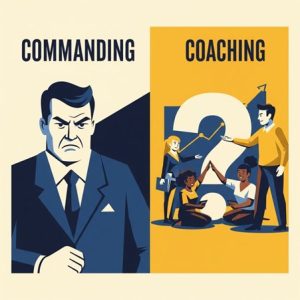THE EMPOWERMENT SHIFT: COACHING OVER COMMANDING.
‘‘Leaders become great, not because of their power, but because of their ability to empower others.’’
-John C. Maxwell
The longer you stay at the centre of every decision, the smaller your leadership impact becomes. Leaders don’t scale by working harder, they scale by empowering others to lead without them. Jack Welch, in his book Winning, said, ‘‘Before you are a leader, success is all about growing yourself. When you become a leader, success is all about growing others.’’
That’s the quiet turning point most leaders miss, moving from being the problem-solver to becoming the thinking partner, from directing action to developing ownership and from control to coaching. This is the empowerment shift and without it, leadership becomes a lid instead of a lever.
So, what does the empowerment shift look like in practice? Here are some of the ways it redefines how leaders think, lead, and build others.

- COACHING VS. COMMANDING: THE EMPOWERMENT DIVIDE
Commanding achieves results, but usually only under your supervision. It fosters short-term execution but often creates dependency, risk aversion, and a culture driven by compliance. Teams await the leader’s oversight, and growth stagnates.
Coaching, on the other hand, activates people’s thinking, shifts ownership from the leader to the team and unlocks creativity, initiative, and confidence. Coaching leaders don’t just issue instructions; they expand others’ capacity to navigate ambiguity, solve problems, and make sound decisions.
Craig Groeschel in Lead Like It Matters. ‘If you delegate tasks, you create followers. If you delegate authority, you create leaders.’’ This shift requires patience and restraint. Coaching doesn’t mean stepping back completely; it means stepping in differently, guiding through questions, clarity, and support rather than control.
- DEVELOPMENTAL CONVERSATIONS: GROWING PEOPLE, NOT JUST OUTPUT
Most leaders know how to discuss performance, but few know how to address potential areas for improvement. That’s the difference between directing and developing.
Developmental conversations focus on the person, not just the task; they surface strengths, blind spots, assumptions, and aspirations. They help people think about their thinking, building a reflective capacity that grows long after the conversation ends.
This kind of dialogue requires curiosity over control and presence over performance, it’s about helping people access their next level of leadership, not by giving them more to do, but by helping them see who they’re becoming in the doing.
Don’t just grow output, grow people. Click Here. to harness the power of Developmental Conversations with the Maxwell DISC Assessment and elevate your leadership impact today.

- ASK BETTER QUESTIONS; DON’T JUST GIVE ANSWERS
One of the hardest habits for seasoned leaders to break is having the answer. It feels efficient. It feels helpful. It feels… responsible, but it also creates a bottleneck. Simon Sinek said, ‘‘The quality of a leader cannot be judged by the answers they give but by the questions they ask.’’ When you solve every problem, you deprive others of the stretch, the struggle, and the breakthrough that produces growth.
Great leaders build a culture of inquiry; they train their teams to think by asking powerful, open-ended questions. These questions build judgement, resilience, and strategic clarity.
Key coaching questions include:
- What’s the real problem we’re trying to solve here?
- What’s your current thinking about this?
- If success were guaranteed, what would you try?
- What decision would you make if I weren’t available?
This isn’t passive leadership, it’s high-leverage leadership activating the minds and instincts of your team, so solutions come from within, not above.
- FROM EXPERT TO FACILITATOR: LET GO TO BUILD UP
The leadership path starts with expertise, you get promoted because you’re effective, knowledgeable, and capable. But that very strength can become your ceiling if you don’t evolve.
At higher levels, your job is no longer to be the most competent person in the room. It’s to cultivate competence in others. It’s to create systems and spaces where other leaders emerge, where decisions happen without you, and success continues in your absence.
This means resisting the urge to fix, save, or solve, it means tolerating short-term mess for long-term maturity, it means trusting that people grow through responsibility, not sheltering.
You’re not abdicating. You’re investing. Strategic empowerment isn’t about disappearing; it’s about designing leadership ecosystems where others thrive.
“Don’t just lead with answers, lead by drawing out others. Click Here. to explore how the Maxwell DISC Assessment equips you to shift from expert to facilitator and build empowered, high-performing teams.

- EMPOWERMENT IS YOUR STRATEGIC ADVANTAGE
Let’s be clear, coaching isn’t soft leadership; it’s a strategic accelerator because ‘‘The strength of a leader is measured by the strength of their team and the freedom with which that team can act.’’ Stephen R. Covey, when you coach well, you create:
- Faster decision-making
- Stronger leadership bench
- Higher trust and engagement
- A culture of initiative and learning
- Greater leadership capacity for yourself
In an organisation, no single leader can carry the thinking for everyone. Empowerment is how you scale good judgment across your organisation.
YOUR LEADERSHIP MOVE THIS WEEK
Look at your calendar. Identify one decision, project, or task you’ve held onto tightly, not because others can’t do it, but because it’s easier or faster for you to take it on.
Now ask:
“Who on my team is ready or nearly ready to lead this?”
Have a conversation. Define expectations. Offer support. Step back just enough for them to step forward.
Lead by lifting others. Make the shift from control to coaching with the Authentic Leader 30-Day Challenge. Click here: https://forms.gle/5WtboshxvenoRLwaA. to lead with purpose.
Empowered leadership isn’t about holding control; it’s about releasing potential. This is how leadership scales, how trust grows, and how real empowerment begins.
Ready to lead differently? Book a Discovery Call here: https://scheduler.zoom.us/grace-centre-for-growth-excellence/discovery-meeting. Let’s explore how we can help you activate the leaders around you.

‘‘Don’t just lead, transform.’’ Elevate your leadership at LIVE2LEAD 2025, where world-class thought leaders meet forward-thinking professionals like you to Connect, Learn and Transform. Click HERE to take your leadership journey to the next level.
Come Along and Grow with Grace
References
John C. Maxwell, The 21 Irrefutable Laws of Leadership
Craig Groeschel, Lead Like It Matters.
Stephen R. Covey, The 8th Habit
Jack Welch, Winning.
Simon Sinek, Start with Why.



